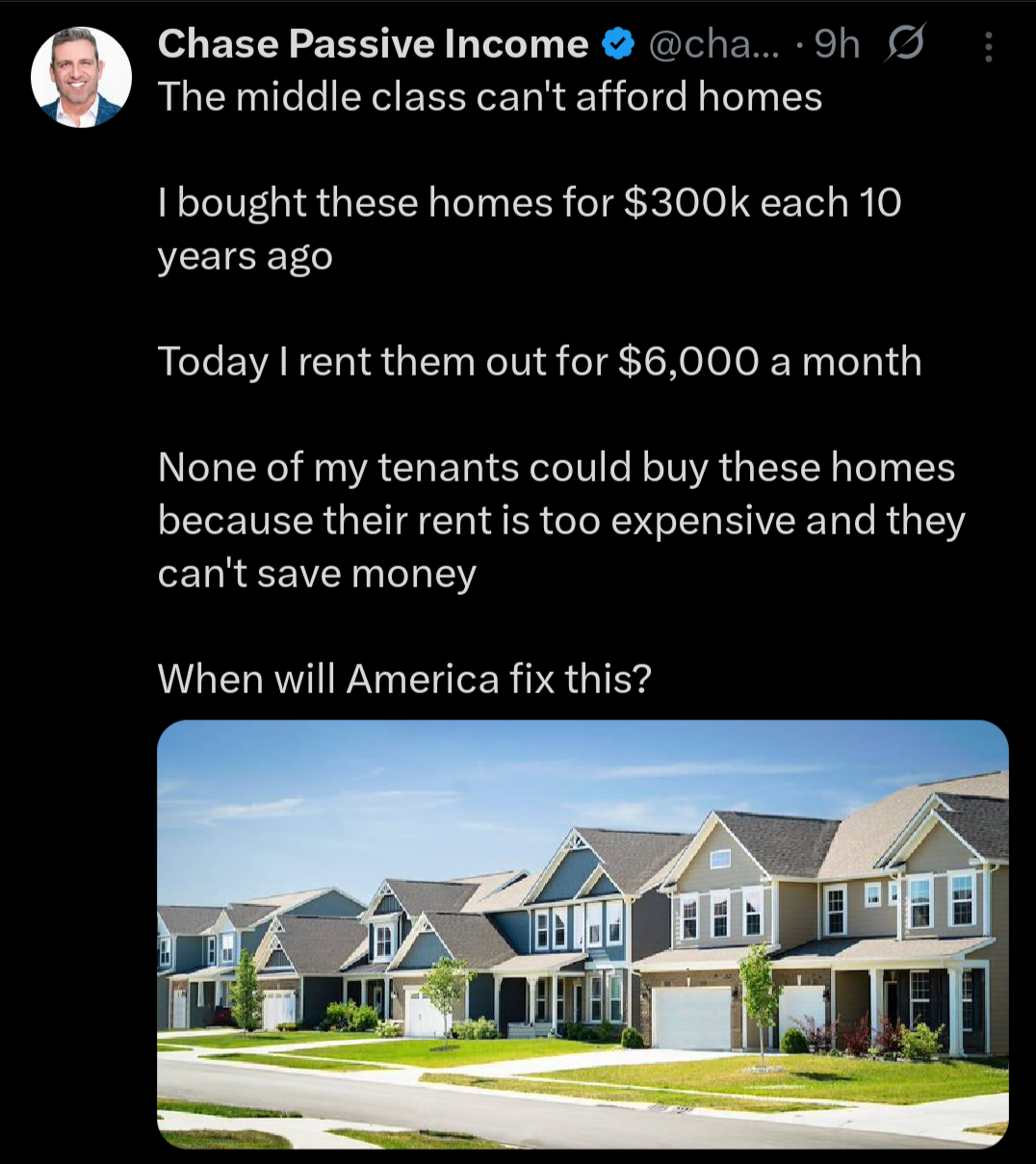this post was submitted on 18 Aug 2025
957 points (99.4% liked)
People Twitter
8680 readers
1004 users here now
People tweeting stuff. We allow tweets from anyone.
RULES:
- Mark NSFW content.
- No doxxing people.
- Must be a pic of the tweet or similar. No direct links to the tweet.
- No bullying or international politcs
- Be excellent to each other.
- Provide an archived link to the tweet (or similar) being shown if it's a major figure or a politician. Archive.is the best way.
founded 2 years ago
MODERATORS
you are viewing a single comment's thread
view the rest of the comments
view the rest of the comments

I might be wrong but the % of homes owned by corporations is really tiny. low single digits if I remember correctly.
Yeah, I don't think so, lol. You're going to have to produce the source. This is from September of last year and doesn't include rental apartment buildings.
https://bloustein.rutgers.edu/who-really-owns-the-u-s-housing-market-the-complete-roadmap/
This says the housing inventory is https://fred.stlouisfed.org/series/ACTLISCOUUS
institutional investors own 500,000 single family homes out of 80-100 million? That article you linked doesnt support your case. Even in (what I assume is) their strongest example institutional investors only own 10% of the rentals.
Where are you getting the 80-100 million homes? Are you including apartments?
Edit:
no this is specifically single family homes
What is your source?
https://www.statista.com/topics/5144/single-family-homes-in-the-us/#topicOverview
I thought you were trolling, but now it's apparent. There's a paywall for any of that info, lol. Have a great week.
Its from census.gov numbers I believe and Statista is a trusted source for market statistics. It seems like you are looking for something to suggest these numbers arent correct. If they are correct and it turns out that institutional investors are a tiny part of the housing market would you change your opinion?
I see you edited your previous comment to include examples. Those examples are extreme outliers. The report you reference shows that institutional investors are completely irrelevant in almost all states except Altanta and jackson vile where they still hold a small % of the housing mostly acquired after the housing collapse. That report also shows mentions that they stabilized house prices in a lot of areas and there is not enough evidence to suggest they've had any effect on home ownership rates or rent increases. Looking at the stats for your biggest outlier it seems that its consistently dropping. Last year only 9% of the homes were purchased by institutional investors.
Is it a good thing that institutional investors are buying up homes? No its not a good thing its a minor issue contributing to the actual problem. The actual problem is homes are not being built and developers are not able to convert land to higher density.
With all the profiteering by corporations since covid, the cost to build a house has gone up substantially. That narrows the consumer base and forces builders to reduce margins. Unless of course they build a "luxury" home or apt. Then you have large investors battling it out and snapping them up. So, it is more profitable to build luxury homes rather than homes for peasants. The investors can afford to set on the empty house and hold them if they can't get the rent they want. In fact, many large investors don't even bother to try to rent and just hold the property to have secure investments during market fluctuations. So they are building like crazy, but the homes they're building can't be afforded by the people that actually need them.
So, it doesn't take a ton of housing being owned by big investors to fuck the market, they just have to be buying up all the new stock in what is already a limited market.
Its not an issue of luxury home construction vs peasant home construction I doubt this even makes a dent. Investors are not buying up empty houses and sitting on them because they are to lazy to rent them out, thats absurd.
The issue is simply that housing development is to slow. The demand to build houses in higher density is there but local zoning laws and nimby residents block the developments. In cities where zoning laws were changed to allow development we see prices decrease.
https://ohiocapitaljournal.com/2024/10/22/report-billionaire-investors-driving-homelessness-housing-costs/#%3A%7E%3Atext=%E2%80%9CWealthy+investors+are+buying+up%2Cestate+as+a+luxury+asset.
https://archive.is/20250110182457/https://www.wsj.com/real-estate/commercial/the-u-s-has-more-fancy-apartments-than-it-is-able-to-fill-f7bca968
I think what you're highlighting is a symptom not the cause.
US homeowner vacancy rate is relatively stable over the past 10 years bouncing between 1-2%. You've highlighted a specific subset of homes where the rate is 8% and im expected to believe that this is causing house prices to inflate? I'm sorry but thats a weak argument. The article you linked says that luxery apartments were built because it was the only way to get acceptable returns from the high valued land and even then the vacancy rate is only 11% for 4-5 star apartments.
Once developers noticed that the demand wasn't there they stopped building luxury apartments but the land value is still to high for them to build the affordable apartments that are in demand. This is a problem only city planning can address. The ways cities can address this is to invest in their own affordable housing units in these areas to drive down the prices by forcing competition. Zone extra land for housing. Basically just build more houses or reduce demand.
Wow, I guess I was wrong. You have convinced me. My facts obviously don't hold a candle to against your strongly held opinion.